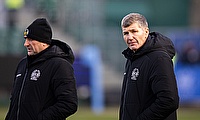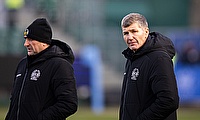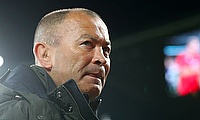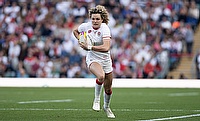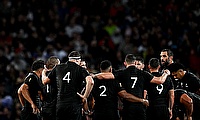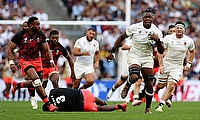Should England look to Slade?
Bold selection calls can make or break a team in a Rugby World Cup year, but even with that guillotine hanging overhead, the time is nigh to give Henry Slade the reins to England Rugby.
English rugby has been on a bit of a rollercoaster ride so far this season. The team started with disappointing losses to New Zealand and South Africa, but boosted spirits with comprehensive victories over Samoa and Australia.
They carried that momentum into the Six Nations, beating Wales in Cardiff and Italy at Twickenham, and whilst neither victory was the finished article, they were immeasurably more impressive then than in the dismantling that followed shortly after in Dublin.
England righted the ship somewhat with victory over Scotland, but the game was an exhibition of missed chances, something which certainly won’t be causing New Zealand or South Africa to lose any sleep.
Away from the results however, one of the biggest positives for England this season has been the growth of their options at fly-half. For so long a problem position, England can now call upon George Ford, Owen Farrell, Danny Cipriani or the aforementioned Slade. All four are either international-calibre or have the potential to play at that level, not to mention the duo of Freddie Burns and Stephen Myler, both of whom have done highly admirable jobs when called upon.
To clarify, this is not a criticism of Ford, Farrell or Cipriani, all of whom seem to sit above Slade in the current England pecking order, but a testament to how extraordinarily skilled Slade already is and that he is ready to be the all-round fly-half that England have craved for so long now.
The young Exeter Chief combines all the best facets of his competitors. He takes on the gain line just as well as Ford, shows physicality in defence which is beginning to approach Farrell’s levels and has the swagger and flair to unlock defences in a Cipriani-esque fashion. His goal kicking is also excellent, currently enjoying a success rate of 84% in the Aviva Premiership, whilst his kicks from hand have repeatedly helped the Chiefs back line exploit blitzing defences this season, not to mention control territory effectively.
Slade also looks the part, too. He is tall and quick, capable of inflicting plenty of damage on opposition defences with his feet, then turning those breaks into even bigger gains by getting his hands up and over tackles, freeing him to offload with abandon. It’s a combination of all these skills mentioned so far that saw him pick up the Aviva Premiership Player of the Month award recently.
There are already growing voices for Slade to feature at inside centre for England and whilst I’m sure he is more than capable of playing that position at a high level, why ask him to move to a position he doesn’t even play at club level? The experience Slade has picked up this season at outside centre has improved him as a player, particularly defensively, but let’s not split hairs about this – Slade is a natural (and phenomenally gifted) fly-half.
Calling for Slade’s inclusion over the likes of Ford and Farrell is perhaps harsh on the pair, as both have done extremely good jobs whilst wearing England’s 10 jersey, but there are limitations to their games.
Take the recent game against Ireland for example. England were awarded a penalty advantage right in front of the posts, something which should be a fly-half’s dream come true. The standoff should realise the three points are in the bag, so why not let it rip and try and create an opportunity for seven points, rather than three?
You see this level of ambition from southern hemisphere fly-halves week in, week out, whilst in the northern hemisphere, Jonathan Sexton certainly wouldn’t leave an opportunity like that untested, nor would England’s second-in-line, Cipriani.
Instead, Ford dropped back into the pocket and kicked a drop goal. To his credit, it was a well struck drop goal, but with the penalty advantage earned, it was the most conservative of conservative calls. To be fair to Ford, the Ireland game was his worst in an England jersey and not a true reflection of his tenure as England’s fly-half, but these are the games when England requires their fly-half to step up and be counted.
Similarly, Farrell’s ability to challenge the gain line has also been called into question by frustrated England fans over recent years, whilst concerns over Cipriani’s defence and ability manage a game have also been raised. In defence of both these players, they are areas which they have made big strides towards improving as of late, but may typecast them into certain roles for England going forward.
Farrell’s England future may be at inside centre, especially given Stuart Lancaster’s desire for a playmaking midfield that can also kick well and defend solidly. On paper, that seems to make Farrell an excellent candidate to fill the role long-term, whilst Cipriani’s ability to open up a game is second to none in English rugby, potentially making him more valuable to England as their bench fly-half, rather than starter.
Is it fair to hang Ford out to dry for one poor outing in the intense atmosphere of a then-potential Grand Slam-decider at the Aviva Stadium? No.
Ford did redeem himself with a good display against Scotland, but as was said before, this is not an indictment of Ford as a bad fly-half. On the contrary, Ford is an excellent young fly-half, this is just a proposal that someone potentially even better is given a shot to steer the English ship.
In fact, if Handré Pollard wasn’t redefining the standards for young fly-halves around the world, the abilities and uniquely diverse skill set of Slade, at the tender age of 21, would be astounding a lot more people.
The safe option for Lancaster would be to continue with Ford or Farrell heading into the RWC, but making the safe decision often doesn’t bring the rewards that being bold can reap. Slade may be young, but he is ready to lead England into a bright future, he just needs to be trusted by Lancaster, along with a number of other Junior World Championship-winners, lest England ultimately end up heading into the 2019 RWC with the inexperienced tag once again.
Making the right decision now at fly-half could influence England’s success over the next decade, for better or for worse.
The All Blacks struck gold in 2004 when they trusted Dan Carter at standoff, pushing the slightly more experienced, but equally promising, Aaron Mauger to inside centre, as well as opting for Carter over Nick Evans.
As with New Zealand, England have a fine array of options at their disposal, but only one of them looks like another Carter.

